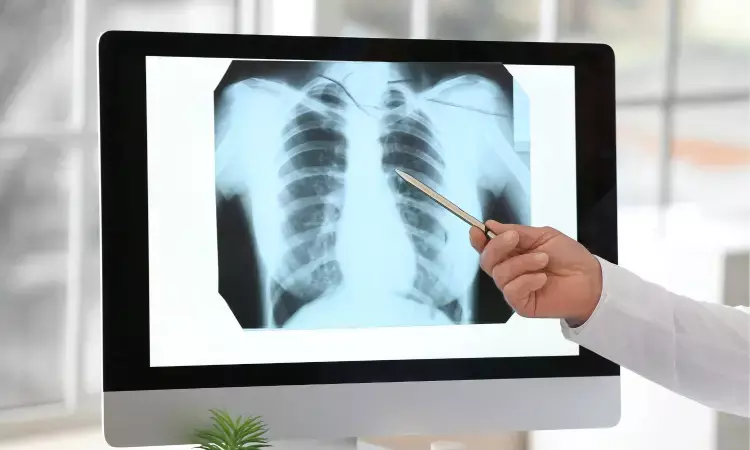- Home
- Medical news & Guidelines
- Anesthesiology
- Cardiology and CTVS
- Critical Care
- Dentistry
- Dermatology
- Diabetes and Endocrinology
- ENT
- Gastroenterology
- Medicine
- Nephrology
- Neurology
- Obstretics-Gynaecology
- Oncology
- Ophthalmology
- Orthopaedics
- Pediatrics-Neonatology
- Psychiatry
- Pulmonology
- Radiology
- Surgery
- Urology
- Laboratory Medicine
- Diet
- Nursing
- Paramedical
- Physiotherapy
- Health news
- Fact Check
- Bone Health Fact Check
- Brain Health Fact Check
- Cancer Related Fact Check
- Child Care Fact Check
- Dental and oral health fact check
- Diabetes and metabolic health fact check
- Diet and Nutrition Fact Check
- Eye and ENT Care Fact Check
- Fitness fact check
- Gut health fact check
- Heart health fact check
- Kidney health fact check
- Medical education fact check
- Men's health fact check
- Respiratory fact check
- Skin and hair care fact check
- Vaccine and Immunization fact check
- Women's health fact check
- AYUSH
- State News
- Andaman and Nicobar Islands
- Andhra Pradesh
- Arunachal Pradesh
- Assam
- Bihar
- Chandigarh
- Chattisgarh
- Dadra and Nagar Haveli
- Daman and Diu
- Delhi
- Goa
- Gujarat
- Haryana
- Himachal Pradesh
- Jammu & Kashmir
- Jharkhand
- Karnataka
- Kerala
- Ladakh
- Lakshadweep
- Madhya Pradesh
- Maharashtra
- Manipur
- Meghalaya
- Mizoram
- Nagaland
- Odisha
- Puducherry
- Punjab
- Rajasthan
- Sikkim
- Tamil Nadu
- Telangana
- Tripura
- Uttar Pradesh
- Uttrakhand
- West Bengal
- Medical Education
- Industry
Respiratory symptoms following swimming-induced pulmonary oedema may persist for months

According to a cohort study of 165 patients diagnosed with swimming-induced pulmonary oedema (SIPE), 38 % of patients reported ongoing symptoms after ten days of diagnosis. The research found the most common symptoms to be shortness of breath and cough. At 30 months, 28% of the patients reported recurrent symptoms while swimming, although only 42% of the total population had swum in open water since the initial diagnosis. Asthma was tied to symptoms, both prolonged and recurrent.
This original research by Dr Linda Kristiansson, MD and colleagues is published in CHEST.
It is already known that SIPE subsides within 24–48 hours. However, more data on comprehensive follow-up studies on symptom duration and long-term effects must be collected.
The main research question here is, What are the symptom duration, recurrence, and long-term effects of SIPE?
This background was studied in a follow-up study conducted based on 165 cases of SIPE from Sweden’s largest open water swimming event, with 26,125 individuals participating during 2017–2019. Telephonic interviews were performed at ten and 30 days to explore symptom duration, recurrence of SIPE symptoms, need for medical evaluation and long-term effects of self-assessed general health and physical activity level.
The key findings of this original research are:
- Follow-up at ten days and 30 months was performed for 132 and 152 cases, respectively.
- The cases were primarily women of the mean age of 48 years.
- At the 10-day follow-up, more than two days of symptom duration was reported in 38% and dyspnea and cough were the common symptoms.
- In patients who were followed up for 30 months, 28 % reported recurrence of respiratory symptoms during open water swimming.
- There was an independent association of Asthma with symptom duration >2 days and recurrence of SIPE symptoms.
- Following SIPE, 93 % of participants reported equal or improved general health and 85 % reported physical activity level.
- 58 % of participants had not swum in open water since the event.
They said, “The study has challenged the established hallmark of SIPE symptom duration of <48 hours, while SIPE recurrence was in the previously reported range.”
At 30 months, most patients reported unchanged self-assessed general health and physical activity level. Researchers provided evidence-based information to swimmers and health care professionals in this study.
Further reading:
Kristiansson, L., Seiler, C., Lundeqvist, D., Eriksson, A., Sundh, J., & Hårdstedt, M. (2023). Symptom Duration, Recurrence, and Long-Term effects of Swimming-Induced pulmonary edema. Chest. https://doi.org/10.1016/j.chest.2023.06.041.
BDS, MDS in Periodontics and Implantology
Dr. Aditi Yadav is a BDS, MDS in Periodontics and Implantology. She has a clinical experience of 5 years as a laser dental surgeon. She also has a Diploma in clinical research and pharmacovigilance and is a Certified data scientist. She is currently working as a content developer in e-health services. Dr. Yadav has a keen interest in Medical Journalism and is actively involved in Medical Research writing.
Dr Kamal Kant Kohli-MBBS, DTCD- a chest specialist with more than 30 years of practice and a flair for writing clinical articles, Dr Kamal Kant Kohli joined Medical Dialogues as a Chief Editor of Medical News. Besides writing articles, as an editor, he proofreads and verifies all the medical content published on Medical Dialogues including those coming from journals, studies,medical conferences,guidelines etc. Email: drkohli@medicaldialogues.in. Contact no. 011-43720751


